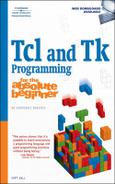This appendix summarizes all the Tcl commands available in Tcl version 8.4.14. It lists each command and a short description of the command’s use or purpose.
Command | Description |
|---|---|
| Execute a command after a specified delay. |
| Append data to a variable. |
| Access and manipulate array variables. |
| Insert and extract data from binary strings. |
| Abort the current loop command. |
| Evaluate one of several scripts, depending on the value of a variable or an expression. |
| Evaluate a script or command, trapping and optionally handling errors or other exception conditions. |
| Change the working directory. |
| Fetch and manipulate time. |
| Close an open I/O channel. |
| Join lists together. |
Skip to the next iteration of a loop. | |
| Execute a Dynamic Data Exchange command (Windows only). |
| Manipulate character encodings. |
| Check for end-of-file condition on an open I/O channel. |
| Raise an error. |
| Evaluate a Tcl script. |
| Invoke a subprocess. |
| Terminate the current Tcl script. |
| Evaluate an expression. |
| Test to see if the most recent input operation emptied the input buffer. |
| Get and set options on an I/O channel. |
| Copy data between I/O channels. |
| Execute a script or command when an I/O channel becomes readable or writable. |
| Interrogate and modify file names and file attributes. |
| Flush any currently buffered output for a channel. |
| Iterate over the elements of one or more lists. |
| Format a string in the style of the C language |
| Execute one or more Tcl scripts or commands a fixed number of iterations. |
| Read an input line from an open I/O channel. |
| Access global variables. |
| Return the name(s) of files that match shell-style glob patterns. |
| Manipulate the list of recently executed Tcl commands. |
| Execute a script or command if a certain condition is true. |
| Increment the value of a variable. |
| Interrogate the internal state of the Tcl interpreter. |
| Create and manipulate Tcl interpreters. |
| Create a string by joining together list elements. |
| Append list elements onto a variable. |
| Retrieve an element from a list. |
| Insert elements into a list. |
| Create a list. |
| Determine the number of elements in a list. |
| Load external application code and initialize new commands. |
| Return one or more elements from a list. |
Replace elements in a list with new elements. | |
| See if a list contains a particular element. |
| Modify the value of a list element. |
| Sort the elements of a list. |
| Interface with Tcl’s memory debugger. |
| Create and manipulate the contexts in which commands and variables are visible. |
| Open a file-based or command pipeline I/Ochannel. |
| Interrogate and manipulate the list of available Tcl pages. |
| Retrieve process identifiers. |
| Create a Tcl procedure. |
| Send output to an open I/O channel. |
| Return the absolute path of the current working directory. |
| Read input from an open I/O channel. |
| Match a regular expression against a string. |
| Manipulate the Windows registry. |
| Perform regular expression-based substitutions. |
| Rename or delete an existing command or procedure. |
| Manipulate Macintosh resources. |
| Return from a procedure, optionally specifying a return value. |
| Parse a string using conversion specifiers in the style of the C language |
| Change the location of the file pointer in an open I/O channel. |
| Set and retrieve variable values. |
| Open an I/O channel to a TCP network connection. |
| Evaluate a file or resource as a Tcl script. |
| Split a string into a syntactically correct Tcl list, automatically handling quoting. |
| Manipulate strings. |
| Perform backslash, command, and variable substitution on a string. |
| Evaluate one of multiple scripts or commands, depending on the value of a control variable. |
| Interrogate the current location of the “file” pointer in an open I/ O channel. |
| Determine the execution time of a script. |
| Monitor and report variable access, command usage, and command execution. |
Handle attempts to use commands that don’t exist. | |
| Delete variables from the current namespace. |
| Process pending events and idle callbacks. |
| Execute a script in a different stack frame. |
| Create link to a variable in a different stack frame. |
| Create and initialize a namespace variable. |
| Process events until a specified variable is updated. |
| Execute a script or command as long as a given condition is met. |
